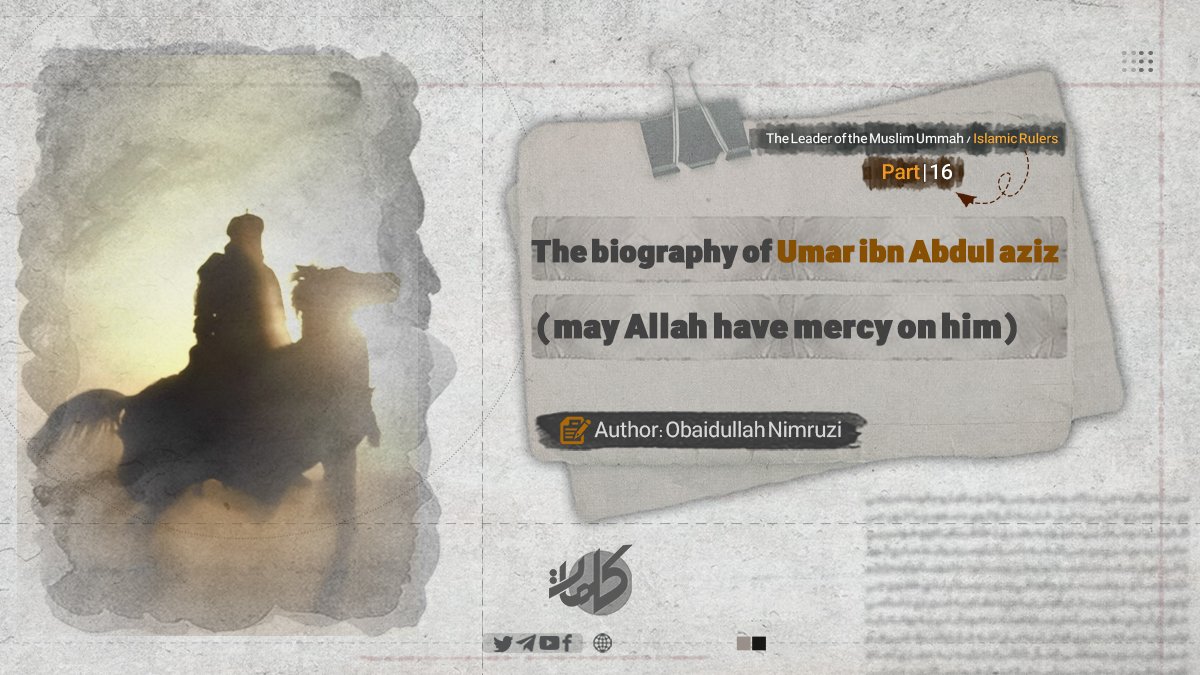
Author: Obaidullah Nimruzi
The Biography of Umar ibn Abdul Aziz ‘May Allah Have Mercy on Him’ (The 16th and Final Part)
The Spirit of the Life of Umar ibn Abdul Aziz (MAPH)
The driving force behind the life of Umar ibn Abdul Aziz and the motivation for all his actions was his strong faith, certainty in the Hereafter, and his desire for Paradise. Every action he took was either out of fear of Allah or love for Him. This was the power that kept one of the greatest rulers on earth steadfast against the temptations of royal luxuries and worldly deceits.
If someone advised him against his principles and encouraged him to indulge in worldly pleasures, he would respond with the verse: “إني أخاف إن عصيت ربي عذاب يوم عظيم.” Translation: “If I disobey my Lord, I fear the torment of a great day.”
Once, he said to his servant—a statement that truly defines his noble character: “Allah Almighty has blessed us with a lofty nature. Whenever I attained a high rank, I aspired for an even higher one. Now, I have reached a position above which there is no higher rank, and now, my only aspiration and desire is Paradise.”
His state of heart and fear of Allah were such that he once asked someone to advise him. That person responded: “If Allah were to cast you into Hell while all the people of the world entered Paradise, what benefit would you gain? And if all the people of the world were to enter Hell while you alone entered Paradise, what harm would it cause you?”
Upon hearing this, he wept so much that the fire of the brazier placed before him was extinguished by his tears.
Yazid ibn Hushab said: “From this incident, it is evident that Hell and Paradise were created only for Umar ibn Abdul Aziz and Hasan al-Basri.”
The Death of Umar ibn Abdul Aziz (MAPH)
If divine will had granted Umar ibn Abdul Aziz the same lengthy reign as previous rulers, the entire Muslim world would have undergone a profound transformation, leaving a lasting impact on history. However, the Umayyads deeply regretted the losses his caliphate had caused to their family’s privileges. Unable to endure his ascetic rule, they soon rid themselves of him, depriving the Muslim community of this divine blessing.
After ruling for only two years and five months, Umar ibn Abdul Aziz passed away in the year 101 AH. Historical evidence suggests that he was poisoned by members of his own family.
Indeed, the blessed life of Umar ibn Abdul Aziz (MAPH) is a vast ocean of lessons and wisdom. Every individual in society, especially rulers and those in positions of power, should take inspiration from his life and make him their role model. He was a true product of Islamic teachings and upbringing.
This just ruler of the Muslims taught the world the true essence of governance and leadership. His caliphate proved that the happiness and prosperity of humanity lie in the establishment of an authentic Islamic system.
During his reign, there were no so-called modern organizations advocating for “human rights, women’s rights, animal rights, children’s rights, etc.” Yet, there was genuine justice, security, faith, equality, compassion, prosperity, and real economic stability—which were felt not only by humans but even by animals. These realities are documented in both Muslim and non-Muslim historical records.
Through his leadership, he demonstrated that a sincere and compassionate ruler can create conditions that save an entire nation from misguidance and destruction.
Moreover, he proved that even at the height of power and authority, one should not forget Allah and His servants. A ruler should not lose himself in his position, nor displease Allah or sacrifice his Hereafter. He should not deprive himself of the company of the poor and the needy, for such gatherings bring divine mercy.
As days and nights continue to pass, governments rise and fall, but honor and virtue remain eternal. History continues to repeat itself, and every human being must strive to leave behind a legacy of goodness.
O Allah, grant us an end that pleases You and leads us to salvation!


